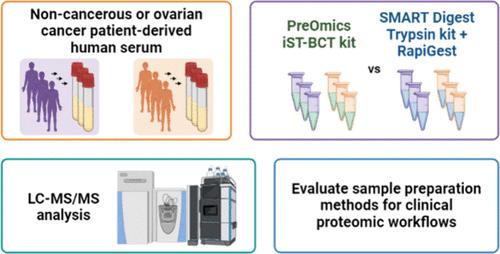Evaluation of Serum Proteome Sample Preparation Methods to Support Clinical Proteomics Applications
IF 3.1
2区 化学
Q2 BIOCHEMICAL RESEARCH METHODS
Journal of the American Society for Mass Spectrometry
Pub Date : 2024-09-12
DOI:10.1021/jasms.4c00131
引用次数: 0
Abstract
Serum contains several proteins that are associated with disease-related processes. Mass spectrometry (MS)-based proteomics approaches greatly facilitate serum protein biomarker development. However, the serum proteome complexity presents a technical challenge for the accurate, sensitive, and reproducible quantification of proteins by MS. Thus, efficient sample preparation methods are of critical importance for serum proteome analyses. In this study, we evaluated the technical performance of two serum proteome sample preparation methods using sera from patients with high-grade serous ovarian cancer and patients with benign nongynecological conditions with a goal of providing insight into their compatibility with clinical proteomics workflows. One method entailed the use of immobilized trypsin (SMART Digest Trypsin) with RapiGest SF, an acid-labile surfactant designed to enhance the in-solution enzymatic digestion of proteins. The other method incorporated a commercially available sample preparation kit, iST-BCT, which contains standardized reagents. Significantly higher protein sequence coverage, albeit with lower digestion efficiency, was obtained with the immobilized trypsin + RapiGest SF workflow, whereas the iST-BCT workflow was quicker and had marginally better reproducibility. Protein relative abundance analysis revealed that the serum proteomes clustered primarily by the sample processing workflow and secondarily by disease state. We conducted a time course study to determine whether differences in the relative abundance of diagnostic high-grade serous ovarian cancer serum protein biomarker candidates were biased according to the duration of enzymatic digestion. Our results highlight the importance of optimizing enzymatic digestion kinetics according to the peptide targets of interest while considering the sensitivity of the downstream analytical method utilized in clinical proteomics workflows designed to measure biomarkers.

评估血清蛋白质组样品制备方法以支持临床蛋白质组学应用
血清中含有多种与疾病相关的蛋白质。基于质谱(MS)的蛋白质组学方法极大地促进了血清蛋白生物标记物的开发。然而,血清蛋白质组的复杂性给质谱准确、灵敏、可重复地量化蛋白质带来了技术挑战。因此,高效的样品制备方法对血清蛋白质组分析至关重要。在这项研究中,我们使用高级别浆液性卵巢癌患者和良性非妇科疾病患者的血清,评估了两种血清蛋白质组样品制备方法的技术性能,目的是深入了解它们与临床蛋白质组学工作流程的兼容性。其中一种方法需要使用固定化胰蛋白酶(SMART Digest Trypsin)和 RapiGest SF,RapiGest SF 是一种酸性表面活性剂,旨在增强溶液中蛋白质的酶解。另一种方法采用了市售的样品制备试剂盒 iST-BCT,其中包含标准化试剂。固定化胰蛋白酶+RapiGest SF工作流程的蛋白质序列覆盖率明显更高,但消化效率较低,而iST-BCT工作流程更快,可重复性稍好。蛋白质相对丰度分析表明,血清蛋白质组主要根据样本处理工作流程而聚类,其次是根据疾病状态而聚类。我们进行了一项时间进程研究,以确定诊断性高级别浆液性卵巢癌血清蛋白候选生物标记物的相对丰度差异是否会因酶解时间的长短而产生偏差。我们的研究结果突显了根据感兴趣的肽靶点优化酶解动力学的重要性,同时考虑到了临床蛋白质组学工作流程中用于测量生物标记物的下游分析方法的灵敏度。
本文章由计算机程序翻译,如有差异,请以英文原文为准。
求助全文
约1分钟内获得全文
求助全文
来源期刊
CiteScore
5.50
自引率
9.40%
发文量
257
审稿时长
1 months
期刊介绍:
The Journal of the American Society for Mass Spectrometry presents research papers covering all aspects of mass spectrometry, incorporating coverage of fields of scientific inquiry in which mass spectrometry can play a role.
Comprehensive in scope, the journal publishes papers on both fundamentals and applications of mass spectrometry. Fundamental subjects include instrumentation principles, design, and demonstration, structures and chemical properties of gas-phase ions, studies of thermodynamic properties, ion spectroscopy, chemical kinetics, mechanisms of ionization, theories of ion fragmentation, cluster ions, and potential energy surfaces. In addition to full papers, the journal offers Communications, Application Notes, and Accounts and Perspectives

 求助内容:
求助内容: 应助结果提醒方式:
应助结果提醒方式:


